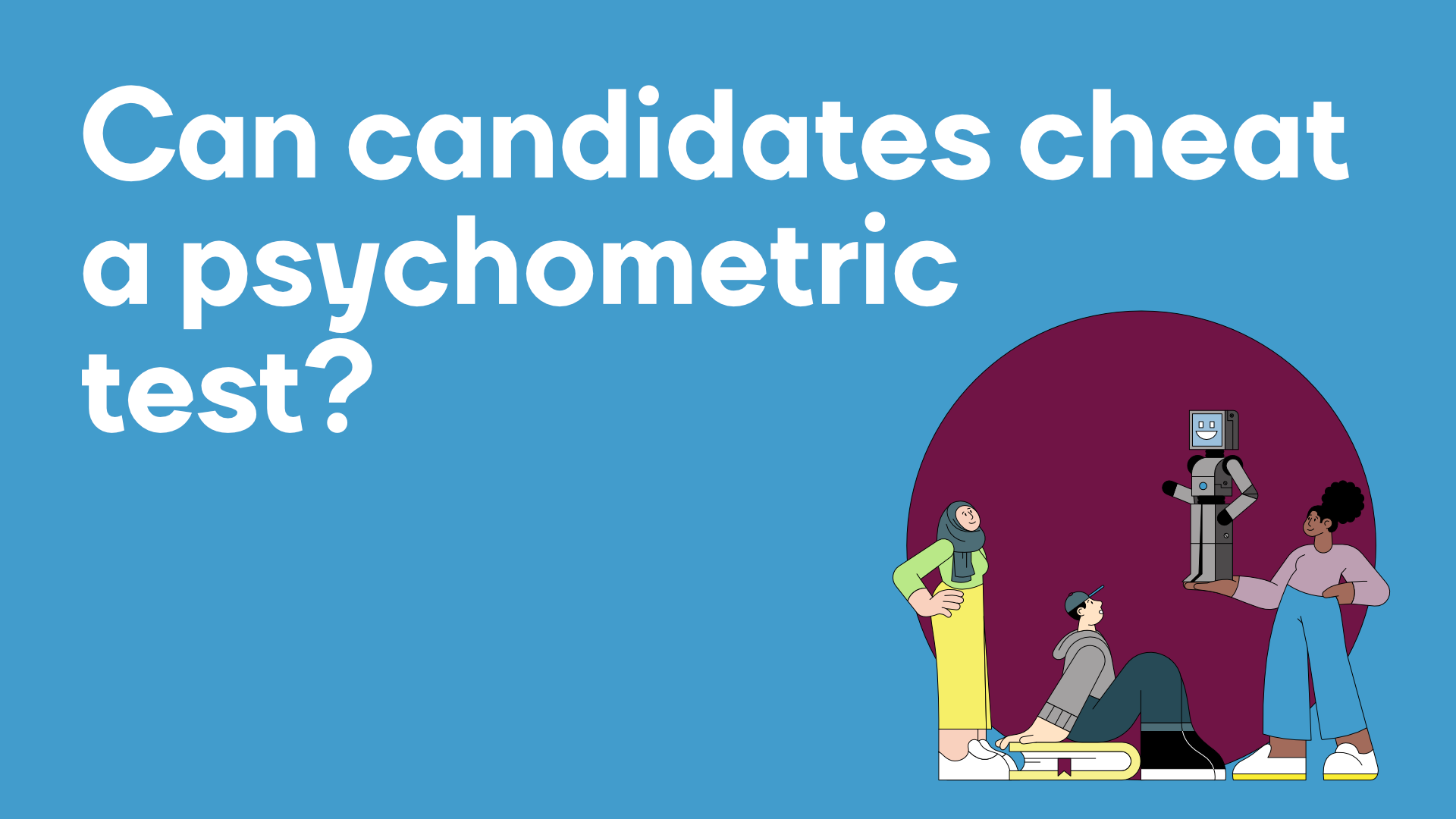”Can candidates cheat a psychometric test?”
As business psychologists we hear this question a lot.

People often worry that candidates can easily tweak their responses to a psychometric assessment to appear in a way that they think will be more desirable, or they can get a friend to complete their ability tests to get a higher score. Similarly, candidates believe that these tests are pitted against them, and that the only possible way to get through them is to cheat.
In reality, there is no guaranteed way to prevent this from happening, aside from truth serum and fingerprint recognition. However, it seems people underestimate our pre-emptive thinking and the effectiveness of simply being truthful with candidates about how their responses will be used. To combat any tactical and fictitious self-improvement, we use a variety of checks and functions to promote honest and realistic responses.
Some pre-emptive strategies we use are:
- Clear instructions and warnings to candidates
- A randomised item bank
- Verification of test scores
- Impression management scales
- Advice on what to do next
1) Understanding & Clarity
The key to ensuring candidates are truthful in their responses and complete assessments to the highest standard is making sure they understand why it’s important.
At Clevry we value the candidates experience and want to ensure they are comfortable doing psychometric assessments. If candidates feel at ease, understand whythey are being asked to do the tests and how the information they provide will be used they are much less likely to be motivated to cheat.
Before starting a personality questionnaire we ensure candidates appreciate we want to understand the real them and, as there are no right or wrong personality preferences, they should be honest and tell us how they see themselves rather than how they would like to be seen. Similarly, before an ability test, candidates are reminded that responses should be their own, they are told the materials allowed (e.g. calculator and rough paper), that there is a possibility of verification (see point 3) and that candidates can contact the test provider if they need adjustments relating to a disability or condition such as larger font or increased time limit.
This clarity, along with the availability of practice questions, should ease anxiety and reduce the worry of performing poorly. If candidates perceive the tests as more transparent and fair they will be less motivated to attempt cheating the system.
2) Randomised Item Banks
For cognitive ability tests we use a randomised bank of items that are continually updated, meaning that even if candidates decide they do want to try and cheat, they could somehow see the items before taking the test or got their hands on a cheat sheet of answers, it is unlikely they would even have a chance to complete those exact questions again during the ability test.
On top of this, even if they were the same questions, research has found minimal results of practice effects on performance.
3) Test Verification
If you are concerned a candidate has not completed an ability test themselves, you can ask them to complete a second test, as a form of verification. This is half the length of the original test and can be done in person to ensure the identity of the candidate, and is based on the idea that candidates would score similarly across tests.
The original test score and verification test score can then be correlated, if there is a low correlation this may be a warning sign and something to bear in mind further into the recruitment process. But equally, this could also be due to other factors such as anxiety.
As part of our cognitive ability test reports you will be able to see the results from the original test and verification side by side as well as guidance on what these results suggest and what to do going forward.
4) Impression Management
In our off-the-shelf Core and Enhanced questionnaires we include a social desirability scale, which is also an optional addition to your bespoke personality questionnaires. This scale measures the response style of the candidate; whether they tend to give responses which are more desirable and create a favourable impression or tend to be more self-critical and make little effort to distort perception. This scale can give you an insight into whether a candidate has attempted to adapt their responses to seem more appealing. This in itself isn’t a bad thing it could indicate that the candidate is concerned with social approval and a people pleaser, or is extremely down to earth and honest about potential weaknesses. But, it is helpful to be aware of when looking at results from other items as it can indicate that candidates have perhaps stretched the truth.
Each scale in a questionnaire also comprises 6 items which include positive and negatively balanced phrasing, randomised throughout the questionnaire. This makes it extremely hard for candidates to effectively and consistently manipulate their answers as they would have to accurately identify which items were related to unknown scales, pick them out from the whole of the questionnaire and then continually answer in the desired direction; all the while not being picked up on by our social desirability scale.
5) Ask the Experts
If after all these checks you are still unsure about whether a candidate has managed to cheat the system or would like further advice about verification results and impression management scales, we are available for enquiries and advice for your psychometric testing please contact us through our contact page.
In summary, candidates can of course try to fake their responses, but we use two lines of defence against this; reducing the motivation or need to cheat in the first place and reducing the likelihood that cheating will be effective. This ensures the attempt to cheat is not an issue for any of our psychometric soft skills assessments.
View the output from our psychometric assessments by downloading sample reports below.



